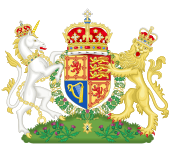- Full fiscal autonomy for Scotland
-
Not to be confused with Calman Plus.
Scotland 
This article is part of the series:
Politics and government of
Scotland- Supreme Court of the United Kingdom
- Supreme Courts
- Sheriff Courts
- Land Courts
- Justice of the Peace Courts
- Lord Lyon Court
Scotland in the UKHer Majesty's Government
Parliament of the United Kingdom
- Scotland Office
- Grand Committee
- Select Committee
- Reserved matters
- Elections
- Constituencies
- List of Scottish MPs
Scotland in the EULocal government
Full fiscal autonomy, sometimes referred to as devolution max[1], devo-max[2] or fiscal federalism,[3] has come to be used to describe a situation where instead of receiving a block grant from the UK Exchequer as at present, the Scottish Parliament would receive all taxation levied in Scotland and would then make payment to the UK government to cover Scotland's share of the cost of providing UK services. Scottish fiscal autonomy, stopping short of full political independence, is usually promoted by advocates of a federal or confederal constitution for the United Kingdom.
Broadly speaking, a greater percentage of those who support further moves towards Scottish independence support a move to greater fiscal autonomy while a greater percentage of those who wish to retain the Union between Scotland and the rest of the UK would be opposed. As early as July 2001, former Conservative Party chancellor Kenneth Clarke, said be believed fiscal autonomy would be "disastrous for the Scottish economy". [4] On the other hand, Robert Crawford, the former head of Scottish Enterprise, said in February 2004 that the Scottish economy "could be improved" by fiscal autonomy. [5]
David Cameron, the present leader of the Conservative Party and Prime Minister, had previously made it clear that he would not stand in the way of handing full taxation powers to the Scottish Parliament if the idea was supported by the Scottish Conservative Party, although they ultimately listen to his direction.[6]
The 2010 Scottish Social Attitudes Survey core finding was that while just 28% of respondents supported Scottish independence, a majority support 'devo max'[7] with 60% of respondents wanting the Scottish Parliament to control Scotland's £18 billion welfare bill (including power over public pensions and benefits), and a majority (59%) also supported taxation levels being decided in Edinburgh rather than London.[8]
Contents
Since the 2011 election of a SNP majority government
The election of a majority Scottish National Party Government in May 2011, committed to holding an independence referendum, has also brought the possibility that Fiscal Autonomy could be an extra option in the vote.[9] Some senior Labour Party figures have also suggested that they would support devo max, including Malcolm Chisholm MSP, [10] Mark Lazarowicz MP,[11] and former First Minister Henry McLeish.[12]
A public opinion poll carried out at the end of October 2011 for the BBC Politics Show indicated that devo-max was the most popular option with Scottish voters: 33% backed devo-max, 28% supported independence and 29% backed no further constitutional change.[13]
References
- ^ McLeish reiterates support for devo-max www.holyrood.com, accessed 23 October 2011
- ^ "Embrace devo-max, Labour told". The Scotsman. 26 October 2011. http://www.scotsman.com/news/politics/embrace_devo_max_labour_told_1_1929545. Retrieved 15 November 2011.
- ^ MacDonald, Ronald; Hallwood, Paul (Jul 2004). "The Economic Case for Fiscal Federalism in Scotland". Working papers. Stamford: University of Connecticut, Department of Economics. pp. 95. http://ideas.repec.org/p/uct/uconnp/2004-42.html#provider. Retrieved 18 November 2011.
- ^ Clarke warns on Scots freedom
- ^ Crawford backs fiscal autonomy
- ^ Cameron says Scotland can have fiscal autonomy if Tories want it
- ^ "Nationalists take extra care choosing day to fit the bill". Edinburgh Evening News. 22 January 2010. http://news.scotsman.com/politics/Ian-Swanson-Nationalists-take-extra.6005369.jp. Retrieved 26 January 2010.
- ^ Carrell, Severin (14 January 2010). "Scots want greater tax-raising powers for Holyrood, survey finds". London: The Guardian. http://www.guardian.co.uk/politics/2010/jan/14/survery-tax-powers-holyrood. Retrieved 26 January 2010.
- ^ Scotland independence vote could contain 'financial autonomy' option www.guardian.co.uk, 8 May 2011
- ^ Malcolm Chisholm: Labour must support Devo-Max and abandon Calman newsnetscotland.com, accessed 23 October 2011
- ^ Salmond gives backing to ‘devo max’ ballot choice www.scotsman.com, 23 October 2011
- ^ McLeish reiterates support for devo-max www.holyrood.com, accessed 23 October 2011
- ^ BBC survey indicates support for Scottish 'devo-max' BBC News, 6 November 2011
See also
- Fiscal federalism
- Economy of Scotland
- Government Expenditure and Revenue Scotland
- Government spending in the United Kingdom
- List of Scotland-related topics
- Politics of Scotland
- Scottish Independence
- Scottish parliament
- Union dividend
External links
Categories:- Fiscal policy
- Scottish Government
- Politics of Scotland
- Public finance of Scotland
Wikimedia Foundation. 2010.
